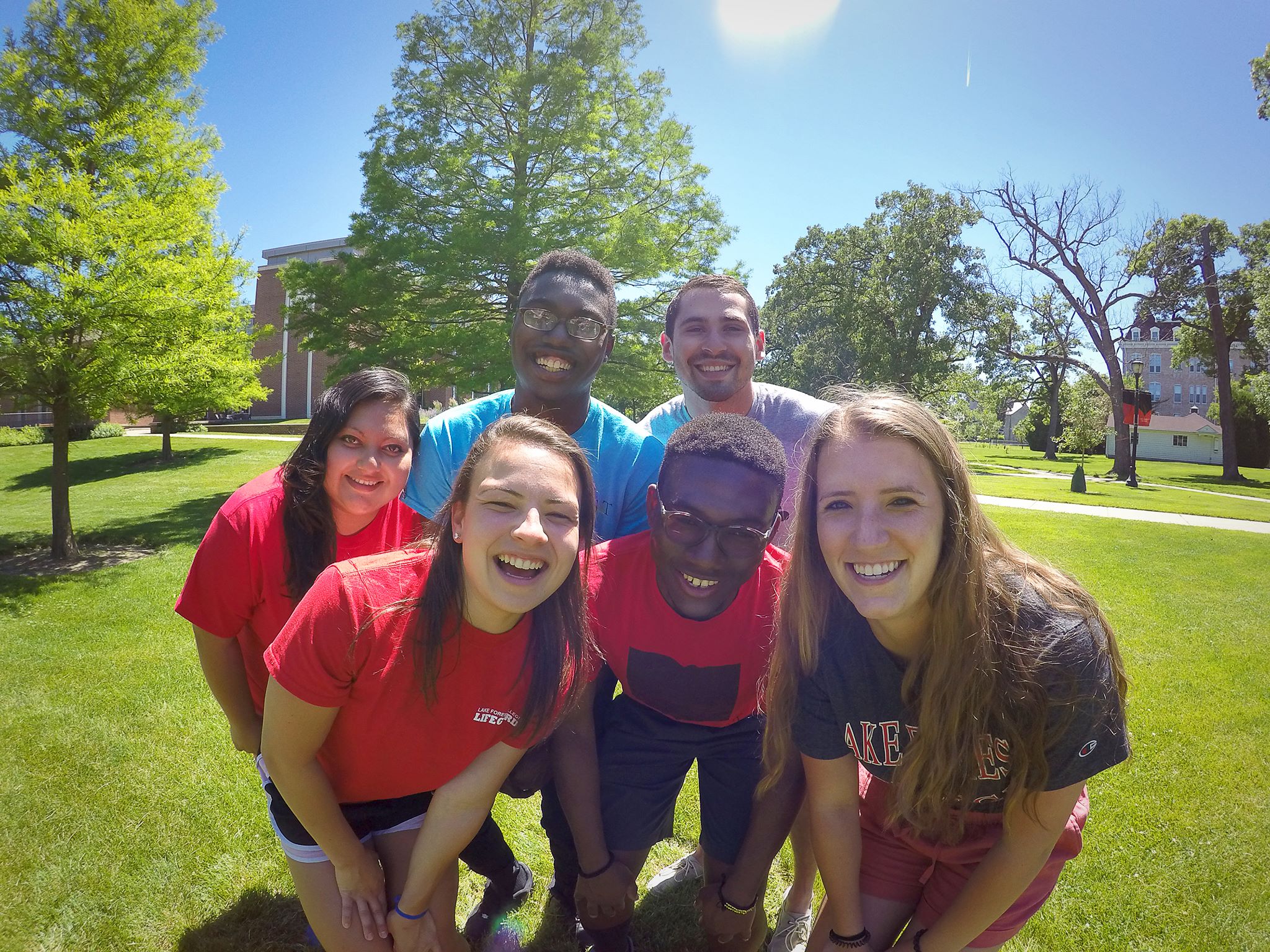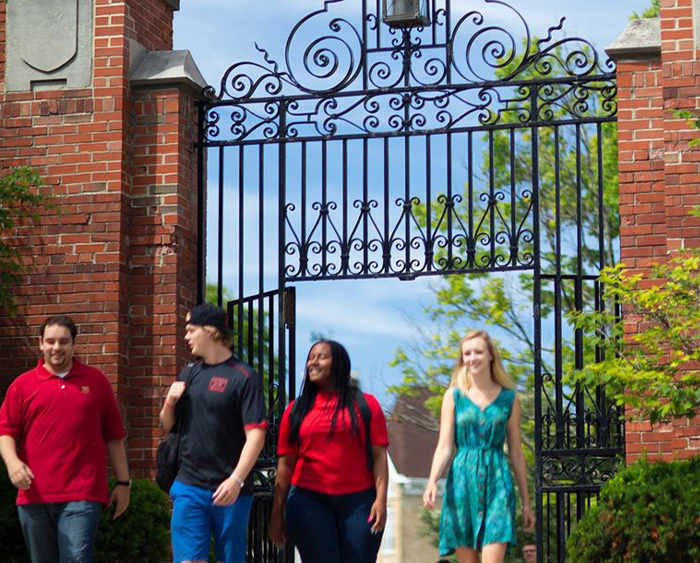Applying to colleges as a first-generation student can be overwhelming. We're here to help you through your college search journey whether it's the first time or the third time. We've compiled several resources and helpful tips on how to make the most of the search process as a first-generation college student. We also have insight from current first-generation students on what their own experiences were like.

SI NECESITA HABLAR CON ALGUIEN EN ESPAÑOL, USTED PUEDE CONTACTAR A MARGARITA URIUSTEGUI O ADRIANA RODRIGUEZ.
Margarita Uriostegui
Assistant Director of Admissions
847-735-5303
muriostegui@lakeforest.edu
Adriana Rodriguez
Associate Director for Financial Aid Operations
847-735-5015
rodriguez@lakeforest.edu
Meet Your Counselor
Your admissions counselor is here to guide you through the application process and help you decide if the College is the right fit for you. Learn more about your counselor and find a time to connect.
Financial Aid and Scholarship Opportunities
First-Year Student Application Deadlines
Early Action/Early Decision I - November 1
Early Action/Early Decision II - January 15
Regular Decision - February 15
Frequently Asked Questions
A first generation college student is the first person in their family to attend college and complete their bachelor’s degree. Even if your older sibling went to college, you can still be considered a first generation college student.
If you have not yet graduated high school or you have graduated high school and you will take your first college classes at Lake Forest College, you can apply as a First-Year student. Even if you have taken dual-enrollment courses, IB courses, or AP courses during high school, you are still considered a First-Year Student for the application process. If you have taken college courses after high school graduation, you are considered a transfer student.
When you apply to a college Early Decision, you are making a binding commitment to the college. You can only apply Early Decision to one school. If you are accepted to the college you’ve applied Early Decision to, you will be automatically enrolled in the college and must withdraw all of your other college applications.
When you apply Early Action, you are simply applying to a college early. Through Early Action, you express interest in the college, but it is not a binding commitment to attend the college. You can apply Early Action to as many colleges as you would like, and you have until May 1 to make your final college decision.
Early Action and Early Decision does not apply to transfer applicants.
The admissions counselor chat is an opportunity for us to get to know you! We want to learn more about how you’re doing, who you are, and what you’re looking forward to in college. We suggest coming prepared with questions about Lake Forest or topics you’d like to learn more about.
Typically, applicants will receive an admissions decision between 1-2 weeks after completing their application and submitting all of their application materials.
Once you have been admitted to the College as a first-year student you have until May 1 to make your final college decision. You can always contact your admissions counselor to schedule a time to chat about your acceptance and next steps!
Transfer students have very different deadlines than First-Year students and many transfer students apply after May 1. Once you are admitted, your admissions counselor will work with you to determine your deadline for accepting your offer of admission.
The Free Application for Federal Student Aid (FAFSA) is an online application available for U.S. Citizens and Permanent Residents to complete in order to receive need-based financial aid from the U.S. government. Need-based financial aid is financial assistance from the state and federal government that is determined by your family’s financial circumstances. Need-based financial aid can come in the form of grants, loans, and work-study positions.
Over 90% of admitted first-year students receive scholarship and/or need-based financial assistance from the College. All our scholarships are guaranteed for all four years as long as you maintain a 2.0 GPA and satisfactory academic progress.
Over 95% of transfer students receive scholarship and/or need-based financial assistance from the College. More information on transfer scholarships can be found here.
In addition to scholarships, we have Financial Aid “Special Circumstance” Forms that may be applicable to your family’s financial circumstances. If so, please complete the forms and email them to the Office of Financial Aid ( finaid@lakeforest.edu).
Yes, students who are neither U.S. citizens nor permanent residents may be eligible for funding from the College, the State of Illinois, and private sources. Unless otherwise noted, non-international, non-FAFSA students may receive up to $46,000 in aid annually. Unless noted otherwise, non-international, non-FAFSA students are eligible for all of our scholarships. You may be eligible for additional outside scholarships, such as through Golden Door Scholars and the DREAMers Roadmap.
Scholarships and grants are essentially “free money”. When you receive a scholarship or grant you do not need to repay that money later. On the other hand, loans are financial aid that you must repay after you’ve graduated from college. Loans may come from the federal government (through completing the FAFSA) or from private organizations.
Typically, applicants will receive their financial aid award letter within two weeks of being accepted to the College. Knowing how to read your award letter with your parent(s) can provide a clear understanding. We are also happy to help!
- Lake Forest has many resources for first generation college students. Most of these resources are available through the Office of Intercultural Relations (OIR), which supports first generation college students throughout their time in college. There are three main programs that OIR provides our first generation students: the First Connection Pre-Orientation Program, the Forester First College Success & Mentoring Program, and the Forester First Parent Orientation.
- The First Connection Pre-Orientation Program provides information and support to help incoming students transition to life at Lake Forest. First Connection also works to enhance the cultural awareness and understanding among its participants by providing meaningful intercultural information and experiences. Click here to learn more.
- Through the Forester First Program, first generation students are matched with upper-level first generation students who serve as a peer mentor throughout the first year at Lake Forest College. Students and peer mentors have weekly individual meetings, as well as participate in community-building activities and workshops. The Forester First Program also helps students secure on-campus jobs and personalized financial aid assistance.
- The Forester First Parent Orientation is a program for parents and family members designed to introduce important resources at the College that will benefit first generation college students.
A major is your primary academic discipline, whereas a minor is a secondary academic discipline that you choose to study. For example, you can major in Neuroscience and minor in Social Justice. There are certain degree requirements you must complete in order to complete your major or minor. At Lake Forest, you may have a combination of majors and minors. Some students have two majors and one minor; others have one major and two minors.
There are many support systems for you as you navigate academics at Lake Forest. From the very beginning you will have your Academic Advisor and Career Advisor to help you plan out your four years in college (and beyond). Additionally, our First Year Studies Course and Forester Fundamental Curriculum will ensure that you have the flexibility to explore all the academic disciplines Lake Forest has to offer. Through exploration and advising support, you will find the major that’s best for you by the end of your sophomore year!
Additional First-Generation Student Resources
- Lake Forest College Outside Scholarships - lakeforest.edu/outside-scholarships
- I'm First - imfirst.org/
- College Board BigFuture College Database - bigfuture.collegeboard.org
- U.S. Department of Labor's Scholarship Database - careeronestop.org/toolkit/training/find-scholarships.aspx
- First Connection - https://www.lakeforest.edu/about-us/administration/campus-life/office-of-community-advocacy-resources-and-empowerment/first-connection
- Health and Wellness - foresternet.lakeforest.edu/student-resources/health-and-wellness
- Academic Support Services - lakeforest.edu/admissions/admitted-students/academic-support-tips
- Richter Scholar Program - lakeforest.edu/academics/student-honors-and-research/richter-scholar-program


